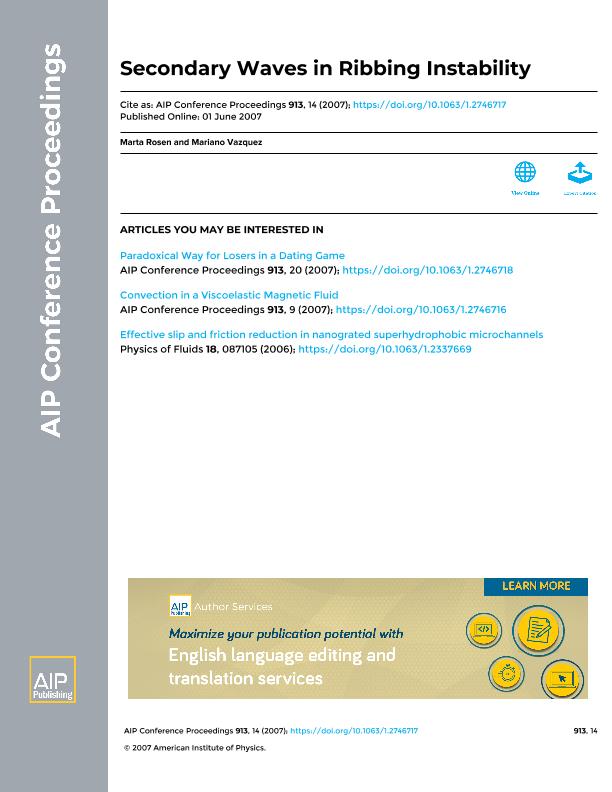Artículo
Secondary waves in Ribbing Instability
Fecha de publicación:
06/2007
Editorial:
American Institute of Physics
Revista:
AIP Conference Proceedings
e-ISSN:
1551-7616
Idioma:
Inglés
Tipo de recurso:
Artículo publicado
Clasificación temática:
Resumen
Many natural and technological processes involve phenomena dominated by interfacial mechanics, i.e., occurring within regions of intersection between several fluid and/or solid phases. In addition to capillary and gravitational effects, interfacial phenomena typically involve the interplay of complex processes such as dynamic contact lines, surface active materials, adhesion, temperature and/or compositional gradients, evaporation, etc. The aim of this work is to analyze the answer of the coating system with one cylinder, when viscoelastic polymers are used. We report new experimental results concerning different dynamical regimes, including traveling waves, obtained in that simple configuration and with free boundary conditions. In the experiments with a non‐Newtonian fluid (viscoelastic) with high molecular weight polymer (PIB_H), propagative modes have been observed for Ca > Ca*. In this case, as the distance to the threshold increases, the digitations standard, initially stationary, presents propagative modes only in some of the regions over the cylinder, and finally the traveling wave is established throughout the whole cylinder without showing any preferential direction. Propagative states have already been observed in the case of two rigid cylinders rotating with opposed surface speeds. However, in that case, the presence of defects does not produce a well‐defined traveling wave and the system shows a rapid transition to chaos. Analyzing the space‐temporal diagrams, the wave phase velocity could be measured with a methodology that allows calculating systematically this value, and we find a linear correlation between the capillary number Ca and the phase velocity Vf. Besides, a detailed description of bifurcations has been made until reaching a chaotic state where it is possible observes the coexistence of traveling wave zones.
Palabras clave:
Instability
,
Viscoelastic
,
Polymers
,
Multifractality
,
Faraday Experiment
,
Chaos
Archivos asociados
Licencia
Identificadores
Colecciones
Articulos(INTECIN)
Articulos de INST.D/TEC.Y CS.DE LA ING."HILARIO FERNANDEZ LONG"
Articulos de INST.D/TEC.Y CS.DE LA ING."HILARIO FERNANDEZ LONG"
Citación
Rosen, Marta; Vazquez, Mariano; Secondary waves in Ribbing Instability; American Institute of Physics; AIP Conference Proceedings; 913; 1; 6-2007; 14-20
Compartir
Altmétricas




